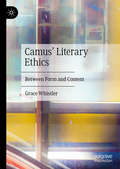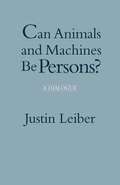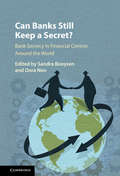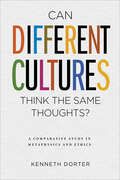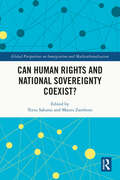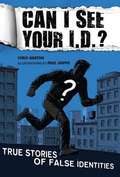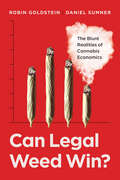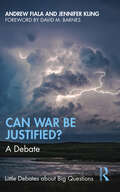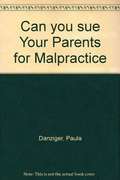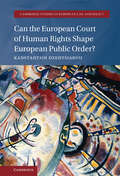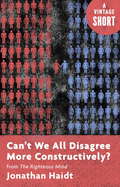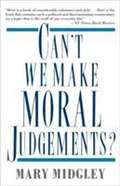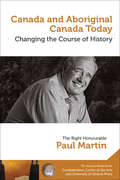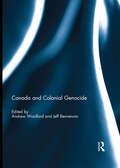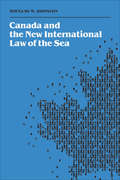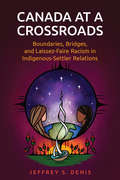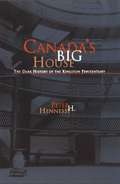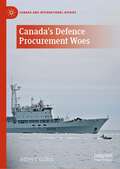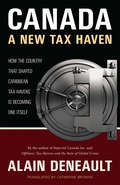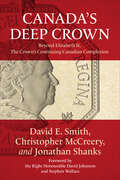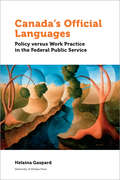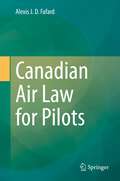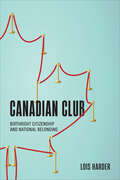- Table View
- List View
Camus' Literary Ethics: Between Form and Content
by Grace WhistlerThis book seeks to establish the relevance of Albert Camus’ philosophy and literature to contemporary ethics. By examining Camus’ innovative methods of approaching moral problems, Whistler demonstrates that Camus’ work has much to offer the world of ethics— Camus does philosophy differently, and the insights his methodologies offer could prove invaluable in both ethical theory and practice. Camus sees lived experience and emotion as ineliminable in ethics, and thus he chooses literary methods of communicating moral problems in an attempt to draw positively on these aspects of human morality. Using case studies of Camus’ specific literary methods, including dialogue, myth, mime and syntax, Whistler pinpoints the efficacy of each of Camus’ attempts to flesh-out moral problems, and thus shows just how much contemporary ethics could benefit from such a diversification in method.
Can Animals And Machines Be Persons?: A Dialogue
by Justin Leiber"This is a dialogue about the notion of a person, of an entity that thinks and feels and acts, that counts and is accountable. Equivalently, it's about the intentional idiom --the well-knit fabric of terms that we use to characterize persons. Human beings are usually persons (a brain-dead human might be considered a human but not a person). However, there may be persons, in various senses, that are not human beings. Much recent discussion has focused on hypothetical computer-robots and on actual nonhuman great apes. The discussion here is naturalistic, which is to say that count and accountability are, at least initially, presumed to be naturally well-knit with the possession of a cognitive and affective life. " --Justin Leiber, from the Introduction
Can Banks Still Keep a Secret?: Bank Secrecy in Financial Centres Around the World
by Sandra Booysen Dora NeoThe duty to keep customer information confidential affects banks on a daily basis. Bank secrecy regimes around the world differ and multi-national banks can find themselves in conflicted positions with a duty to protect information in one jurisdiction and a duty to disclose it in another. This problem has been heightened by the international trend promoting information disclosure in order to combat tax evasion, money laundering and terrorist financing. The US Foreign Account Tax Compliance Act (FATCA) is perhaps the most well-known. At the same time, data protection legislation is proliferating around the world. This book offers a holistic treatment of bank secrecy in major financial jurisdictions around the world, east and west, by jurisdictional experts as well as chapters by subject specialists covering the related areas of confidentiality in its broader privacy context, data protection, conflicts of laws, and exchange of information for the purposes of combatting international crime.
Can Different Cultures Think the Same Thoughts?: A Comparative Study in Metaphysics and Ethics
by Kenneth Dorter&“A welcome contribution to the burgeoning multicultural revolution in philosophy . . . persuasively shows that ethics cannot be innocent of metaphysics.&” —Bryan W. Van Norden, author of Introduction to Classical Chinese Philosophy Kenneth Dorter&’s Can Different Cultures Think the Same Thoughts? is a study of fundamental issues in metaphysics and ethics across major philosophical traditions of the world, including the way in which metaphysics can be a foundation for ethics, as well as the importance of metaphysics on its own terms. Dorter examines such questions through a detailed comparison of selected major thinkers and classic works in three global philosophical traditions, those of India, China, and the West. In each chapter Dorter juxtaposes and compares two or more philosophers or classic works from different traditions, from Spinoza and Shankara, to Confucius and Plato, to Marcus Aurelius and the Bhagavad Gita. In doing so he explores different perspectives and reveals limitations and assumptions that might otherwise be obscure. The goal of Dorter&’s cross-cultural approach is to consider how far works from different cultures can be understood as holding comparable philosophical views. Although Dorter reveals commonalities across the different traditions, he makes no claim that there is such a thing as a universal philosophy. Clearly there are fundamental disagreements among the philosophers and works studied. Yet in each of the case studies of a particular chapter, we can discover a shared, or at least analogous, way of looking at issues across different cultures. All those interested in metaphysics, ethics, Indian philosophy, Chinese philosophy, and comparative philosophy will find much of interest in this book.
Can Human Rights and National Sovereignty Coexist? (Global Perspectives on Immigration and Multiculturalisation)
by Mauro Zamboni Tetsu SakuraiLooking at two of the key paradigms of the post-Cold War era–national sovereignty, and human rights – this book examines the possibilities for their reconciliation from a global perspective. The real or imagined fear of a flood of immigrants has caused and fuelled the surge of an amalgam of populist political forces, anti-immigrant movements, and exclusionist nationalism in many developed countries. In the last decade, we have witnessed the emergence of two phenomena in the political and legal spheres. On the one hand, there are liberal globalists asking for respect and the protection of the basic human rights of migrants and asylum seekers and arguing for their civic and social integration into host societies. On the other hand, there are growing calls for a tougher stance on immigration, and powerful populist politicians and governments have emerged in many developed countries. How can the idea of universal human rights survive exclusionist nationalism that uses a populist, unscrupulous approach to its advantage? The contributors to this book explore the meaning of, and possible solutions to, this dilemma using a wide range of approaches and seek appropriate ways of dealing with these normative predicaments shared by many developed societies. Scholars and students of human rights, migration, nationalism and multiculturalism will find this a very valuable resource.
Can I See Your I.D.?: True Stories of False Identities
by Paul Barton Chris HoppeTrue crime, desperation, fraud, and adventure: From the impoverished young woman who enchanted nineteenth-century British society as a faux Asian princess, to the sixteen-year-old boy who "stole" a subway train in 1993, to the lonely but clever Frank Abagnale of Catch Me if You Can fame, these ten vignettes offer riveting insight into mind-blowing masquerades. Graphic panels draw you into the exploits of these pretenders, and meticulously researched details keep you on the edge of your seat. Each scene is presented in the second person, a unique point of view that literally places you inside the faker's mind. With motivations that include survival, delusion, and plain, old-fashioned greed, the psychology of deception has never been so fascinating or so close at hand.
Can Legal Weed Win?: The Blunt Realities of Cannabis Economics
by Dr. Robin Goldstein Prof. Daniel SumnerTwo economists take readers on a tour of the economics of legal and illegal weed, showing where cannabis regulation has gone wrong and how it could do better. Cannabis "legalization" hasn't lived up to the hype. Across North America, investors are reeling, tax collections are below projections, and people are pointing fingers. On the business side, companies have shut down, farms have failed, workers have lost their jobs, and consumers face high prices. Why has legal weed failed to deliver on many of its promises? Can Legal Weed Win? takes on the euphoric claims with straight dope and a full dose of economic reality. This book delivers the unadulterated facts about the new legal segment of one of the world's oldest industries. In witty, accessible prose, economists Robin Goldstein and Daniel Sumner take readers on a whirlwind tour of the economic past, present, and future of legal and illegal weed. Drawing upon reams of data and their own experience working with California cannabis regulators since 2016, Goldstein and Sumner explain why many cannabis businesses and some aspects of legalization fail to measure up, while others occasionally get it right. Their stories stretch from before America's first medical weed dispensaries opened in 1996 through the short-term boom in legal consumption that happened during COVID-19 lockdowns. Can Legal Weed Win? is packed with unexpected insights about how cannabis markets can thrive, how regulators get the laws right or wrong, and what might happen to legal and illegal markets going forward.
Can War Be Justified?: A Debate (Little Debates about Big Questions)
by Andrew Fiala Jennifer KlingCan war be justified? Pacifists answer that it cannot; they oppose war and advocate for nonviolent alternatives to war. But defenders of just war theory argue that in some circumstances, when the effectiveness of nonviolence is limited, wars can be justified. In this book, two philosophers debate this question, drawing on contemporary scholarship and new developments in thinking about pacifism and just war theory. Andrew Fiala defends the pacifist position, while Jennifer Kling defends just war traditions. Fiala argues that pacifism follows from the awful reality of war and the nonviolent goal of building a more just and peaceful world. Kling argues that war is sometimes justified when it is a last-ditch, necessary effort to defend people and their communities from utter destruction and death. Pulling from global traditions and histories, their debate will captivate anyone who has wondered or worried about the morality of political violence and military force. Topics discussed include ethical questions of self-defense and other-defense, the great analogy between individuals and states, evolving technologies and methods of warfighting, moral injury and post-traumatic stress disorder, broader political and communal issues, and the problem of regional security in a globalizing world. The authors consider cultural and religious issues as well as the fundamental question of moral obligation in a world saturated in military conflict. The book was written in the aftermath of the war on terrorism and includes reflection on lessons learned from the past decades of war, as well as hopes for the future in light of emerging threats in Europe and elsewhere. The book is organized in a user-friendly fashion. Each author presents a self-contained argument, which is followed by a series of responses, replies, and counter-arguments. Throughout, the authors model civil discourse by emphasizing points of agreement and remaining areas of disagreement. The book includes reader-friendly summaries, a glossary of key concepts, and suggestions for further study. All of this will help students and scholars follow the authors’ dialogue so they may develop their own answer to the question of whether war can be justified. Key Features Summarizes the debate between pacifism and just war theory Considers historical and traditional sources as well as contemporary scholarship and applications Models philosophical dialogue and civil discourse, while seeking common ground Discusses issues of concern in contemporary warfighting and peacemaking, while offering an analysis of the war on terrorism
Can You Sue Your Parents for Malpractice?
by Paula DanzigerLauren's fed up. She's been dumped by her boyfriend and pushed around by her parents. Everyone seems to be making decisions for her - she's even got to share a bedroom with her annoying little sister. Which is why she decides to take a new class at school: Law for Children and Young People. She's determined to find out her rights, and stand up for them. What she isn't expecting to find is a new boyfriend - especially one who's a whole year younger than her...
Can the European Court of Human Rights Shape European Public Order? (Cambridge Studies in European Law and Policy)
by Kanstantsin DzehtsiarouIn this book, Kanstantsin Dzehtsiarou argues that, from the legal perspective, the formula 'European public order' is excessively vague and does not have an identifiable meaning; therefore, it should not be used by the European Court of Human Rights (ECtHR) in its reasoning. However, European public order can also be understood as an analytical concept which does not require a clearly defined content. In this sense, the ECtHR can impact European public order but cannot strategically shape it. The Court's impact is a by-product of individual cases which create a feedback loop with the contracting states. European public order is influenced as a result of interaction between the Court and the contracting parties. This book uses a wide range of sources and evidence to substantiate its core arguments: from a comprehensive analysis of the Court's case law to research interviews with the judges of the ECtHR.
Can the World be Wrong?: Where Global Public Opinion Says We're Headed
by John Elkington Doug MillerWhen the global economy and world order become uncertain, where do we look for a sense of where things are heading? Can the World Be Wrong? lays out a compelling case for looking to long-term trends in global public opinion to help predict the future. Written by a pioneer of global polling, the book is provocatively illustrated by decade-long public opinion trends across 20 countries, on subjects ranging from geopolitics, globalization, the economy, the role of companies and the UN, to changing consumer trends and the future of democracy in the 21st century. Doug Miller, the founder and Chairman of the global research consultancy GlobeScan Inc., offers 30 never-before-released global opinion polls that inform this exposé of where the world may be headed. This essentially optimistic book delivers a fascinating briefing on below-the-radar trends that business leaders and policy-makers follow closely and thoughtful citizens need to understand. Miller brings his topics alive with behind-the-scenes looks at the World Economic Forum in Davos, the World Social Forum in Porto Alegre (Brazil), the International Business Leaders Forum in London, the United Nations Headquarters in New York, the White House, and boardrooms around the world. Can the World be Wrong? reveals what we really think of our leaders, businesses and policy-makers, and what this might all say about where we're headed in the 21st century. The book is essential reading for leaders, managers, policy-makers and researchers seeking to understand the power of global opinion and the implications it may have.
Can't We All Disagree More Constructively?: from The Righteous Mind
by Jonathan HaidtA Vintage Shorts Selection As America descends deeper into polarization and paralysis, social psychologist Jonathan Haidt has done the seemingly impossible--he has explained the origins of morality, politics, and religion in a way that speaks to everyone on the political spectrum. Drawing on twenty-five years of groundbreaking research, Haidt shows why liberals, conservatives, and libertarians have such different intuitions about right and wrong, and why we need the insights of each if we are to flourish as a nation. Here is the key to understanding the miracle of human cooperation and the eternal curse of moralistic aggression, across the political divide and around the world. An ebook short.
Can't We Make Moral Judgements?
by Mary MidgleyIn this book, Mary Midgely turns a spotlight on the fashionable view that we no longer need or use moral judgements. She shows how the question of whether or not we can make moral judgements must inevitably affect our attitudes to the law and its institutions, but also to events that occur in our daily lives.
Canada and Aboriginal Canada Today - Le Canada et le Canada autochtone aujourd’hui: Changing the Course of History - Changer le cours de l’histoire (The Symons Medal Series/Collection de la Médaille Symons #1)
by The Right Honourable Paul Martin/Le très honorable Paul Martin Paul MartinDans la conférence prononcée comme récipiendaire de la médaille Symons en 2013, le très honorable Paul Martin, vingt-et-unième premier ministre du Canada, s'appuie sur tout le savoir et le vécu de sa remarquable carrière publique, afin d'expliquer le défi d'obtenir justice pour les peuples autochtones du Canada. Se penchant sur les racines historiques des enjeux actuels ainsi que les priorités contemporaines, monsieur Martin affirme que le progrès futur des peuples autochtones du Canada dépend de l'atteinte d'une forme de gouvernement autochtone autonome, accompagné d'un financement adéquat. Mais par-dessus tout, il lance un appel éloquent et urgent à l'action : les Canadiens et les Canadiennes doivent faire aujourd'hui preuve du même type d'imagination, de générosité et de courage qu'ont démontré les Pères de la Confédération lors de la Conférence de Charlottetown en 1864. Le Canada et le Canada Autochtone aujourd'hui. Changer le cours de l'histoire est une contribution vitale au débat canadien sur le rôle des peuples autochtones au Canada d'aujourd'hui et de demain. C'est une lecture incontournable pour tous ceux et celles qui veulent mieux connaître les racines historiques des défis actuels et réfléchir sur les questions de justice et d'égalité pour les Autochtones du Canada aujourd'hui. L'une des distinctions les plus prestigieuses au Canada, la médaille Symons est présentée chaque année par le Centre des arts de la Confédération, l'institution commémorative nationale établie en l'honneur des Pères de la Confédération, à un lauréat ayant contribué de façon exceptionnelle à la société canadienne. ------------ In his 2013 Symons Medal lecture, the Right Honourable Paul Martin, the twenty-first prime minister of Canada, brings to bear all the knowledge and experience of his remarkable public career to explain the challenge of achieving justice for the Aboriginal peoples of Canada. Exploring both historic roots and current priorities, Mr. Martin argues self-government is an essential condition for Canada's Aboriginal peoples, but must be accompanied by adequate funding. Above all, he issues an urgent, eloquent and deeply informed call to action, calling on Canadians to exercise, today, the same kind of imagination, generosity and courage that the Fathers of Confederation showed, when they met at Charlottetown, in 1864. Canada and Aboriginal Canada Today: Changing the Course of History is a vitally important contribution to the ongoing debate about the role of Canada's aboriginal peoples in the Canada of today and tomorrow. It is essential reading for all Canadians who want to learn about the historic roots of current challenges, and to reflect upon the issues of justice and equality for Canada's Aboriginal peoples today. The Symons Medal, one of Canada's most prestigious honours, is presented annually by the Confederation Centre of the Arts, Canada's national memorial to the Fathers of Confederation, to honour persons who have made an exceptional and outstanding contribution to Canadian life.
Canada and Colonial Genocide
by Andrew Woolford and Jeff BenvenutoSettler colonialism in Canada has traditionally been portrayed as a gentler, if not benevolent, colonialism—especially in contrast to the Indian Wars in the United States. This national mythology has penetrated into comparative genocide studies, where Canadian case studies are rarely discussed in edited volumes, genocide journals, or multi-national studies. Indeed, much of the extant literature on genocide in Canada rests at the level of self-justification, whereby authors draw on the U.N Genocide Convention or some other rubric to demonstrate that Canadian genocides are a legitimate topic of scholarly concern.In recent years, however, discussion of genocide in Canada has become more pronounced, particularly in the wake of the findings of the Truth and Reconciliation Commission of Canada. This volume contributes to this ongoing discourse, providing scholarly analyses of the multiple dimensions or processes of colonial destruction and their aftermaths in Canada. Various acts of genocidal violence are covered, including residential schools, repressive legal or governmental controls, ecological destruction, and disease spread. Additionally, contributors draw comparisons to patterns of colonial destruction in other contexts, examine the ways in which Canada has sought to redress and commemorate colonial harms, and present novel theoretical and conceptual insights on colonial/settler genocides in Canada. This book was previously published as a special issue of the Journal of Genocide Research.
Canada and the New International Law of the Sea
by Douglas JohnstonThis is the last of three volumes dealing with the International Legal Environment (see list in back of book), included in the Collected Research Studies of the Royal Commission on the Economic Union and Development Prospects for Canada. The Third United Nations Conference on the Law of the Sea (UNCLOS 3) culminated in the adopted of the United Nations convention on the law of the sea in 1982. Since then 150 countries, including Canada, have signed this historic treaty. It affects Canada's four major ocean industries: fishing, offshore petroleum, shipping and ocean mining. As Canada contemplates ratification of this agreement, it must consider these as well as several other maritime matters, including transit management, offshore development, marine-technology development and ocean-science policy. This volume delineates the issues and their implications for Canada's future at sea, and recommends the establishment of an independent advisory body to ensure serious and comprehensive treatment of maritime concerns.
Canada at a Crossroads: Boundaries, Bridges, and Laissez-Faire Racism in Indigenous-Settler Relations
by Jeffrey DenisDrawing on group position theory, settler colonial studies, critical race theory, and Indigenous theorizing, Canada at a Crossroads emphasizes the social psychological barriers to transforming white settler ideologies and practices and working towards decolonization. After tracing settlers’ sense of group superiority and entitlement to historical and ongoing colonial processes, Denis illustrates how contemporary Indigenous and settler residents think about and relate to one another. He highlights how, despite often having close cross-group relationships, residents maintain conflicting perspectives on land, culture, history, and treaties, and Indigenous residents frequently experience interpersonal and systemic racism. Denis then critically assesses the promise and pitfalls of commonly proposed solutions, including intergroup contact, education, apologies, and collective action, and concludes that genuine reconciliation will require radically restructuring Canadian society and perpetually fulfilling treaty responsibilities.
Canada's Big House: The Dark History of the Kingston Penitentiary
by Peter H. HennessyA report in 1833 by a committee of three respected Kingston colonials called for the construction of a limestone penitentiary on Hatter’s Bay to the west of the town. Their report contained these words of advice for its future governors: "…[shall] be a place by every means not cruel and not affecting the health of the offender, [but] shall be rendered so irksome and so terrible that during his lifetime he may dread nothing so much as a repetition of the punishment…" The obvious contradiction within this historical mandate of Canada’s Big House has bedevilled the entire history of the jail. Its original high moral purpose - penitence through silent reflection - drifted away into the foggy realm of official myth almost as soon as the first convicts arrived in 1835.This semi-documentary study of the Kingston Penitentiary by a local writer and historian lays bare in cool prose the rapid descent from puritanical purpose to merely punitive management. For the first 75 years, repression was accepted as the norm, even applauded, by the local citizens, some of the inmates, and the political establishment. Over the last hundred years, repressive practices at Kingston Peneitentiary have been publicized, analyzed, and increasingly denounced. In the outcome, the Big House at Kingston has become almost unmanageable. What to do with it? The question still hangs in the air.
Canada's Defence Procurement Woes (Canada and International Affairs)
by Jeffrey F. CollinsThis book challenges the perceived underlying causes and culprits of the ongoing challenges in Canadian defence procurement, arguing that although headlines often put the blame on the political leadership, the defence procurement bureaucracy, ongoing pressures in the defence industry and continuous demands placed on Canada though its alliances also carry a large part of the responsibility. Focusing on four main case studies: the Fixed Wing Search and Rescue Plane, the Joint Support Ships, the Medium Support Vehicle System and the Halifax Class Modernization, the author offers a comparative analysis of how these ongoing procurement efforts were dealt with by different administrations, from Jean Chrétien and Paul Martin to Stephen Harper.
Canada's Indigenous Constitution
by John BorrowsCanada's Indigenous Constitution reflects on the nature and sources of law in Canada, beginning with the conviction that the Canadian legal system has helped to engender the high level of wealth and security enjoyed by people across the country. However, longstanding disputes about the origins, legitimacy, and applicability of certain aspects of the legal system have led John Borrows to argue that Canada's constitution is incomplete without a broader acceptance of Indigenous legal traditions.With characteristic richness and eloquence, John Borrows explores legal traditions, the role of governments and courts, and the prospect of a multi-juridical legal culture, all with a view to understanding and improving legal processes in Canada. He discusses the place of individuals, families, and communities in recovering and extending the role of Indigenous law within both Indigenous communities and Canadian society more broadly. This is a major work by one of Canada's leading legal scholars, and an essential companion to Drawing Out Law: A Spirit's Guide.
Canada: A New Tax Haven
by Alain Deneault Catherine BrowneIn Canada: A New Tax Haven, Alain Deneault traces Canada's relationship with Commonwealth Caribbean nations back through the last half of the twentieth century, arguing that the involvement of Canadian financiers in establishing and maintaining Caribbean tax havens has predisposed Canada to become a tax haven itself - a metamorphosis well under way.Canada was linked to Caribbean nations long before they became tax havens. In the 1950s, an ex-governor of Canada's central bank attempted to establish a low taxation regime in Jamaica. In the 1960s, the transformation of the Bahamas into a tax haven characterized by impenetrable banking secrecy was shaped by a minister of finance who sat on the Royal Bank of Canada's board of directors. A Calgary lawyer and former Conservative Party heavyweight drew up the clauses that transformed the Cayman Islands into an opaque offshore jurisdiction. For years, Canadian politicians have debated annexing tax havens such as the Turks and Caicos Islands, making them part of Canadian territory. Canada has signed a free-trade agreement with Panama and is currently seeking a wider agreement with countries in CARICOM, the Caribbean economic community. And, notably, Canada currently shares its seat at the World Bank and the International Monetary Fund with a group of Caribbean tax havens.These exercises in fostering fiscal and banking leniency have predisposed Canada to become one of the most attractive tax havens to foreign interests. Not only does Canada offer one of the lowest corporate tax rates in the world, but a number of loopholes encourage companies to relocate to Canada as if it were Barbados or Bermuda.Canada: A New Tax Haven is an attempt to analyze the situation and address its implications for Canadians.
Canada’s Deep Crown: Beyond Elizabeth II, The Crown’s Continuing Canadian Complexion
by David Smith Christopher McCreery Jonathan ShanksThe Crown in Canada has had a profound influence in shaping a country and a constitution that embraces the promotion of political moderation, societal accommodation, adaptable constitutional structures, and pluralistic governing practices. While none of these features themselves originated through legislative or constitutional action, David E. Smith, Christopher McCreery, and Jonathan Shanks propose that all reflect the presence and actions of the Crown. Examining how a constitutional monarchy functions, Canada’s Deep Crown discusses how the legal and institutional abstractions of the Crown vary depending on the circumstances and the context in which it is found. The Crown presents differently depending on who is observing it, who is representing it, and what role it is performing. With a focus on the changes that have taken place over the last fifty years, this book addresses the role of the Crown in dispersing power throughout Canada’s system of government, the function the sovereign, governor general, and lieutenant governors play, and how the demise of the Crown and transition to a new sovereign is likely to unfold.
Canada’s Official Languages: Policy Versus Work Practice in the Federal Public Service (Politics and Public Policy)
by Helaina GaspardCanada’s official languages legislation fundamentally altered the composition and operational considerations of federal institutions. With legislative change, Canada’s public service has achieved the equitable representation of its two official languages groups, provided services to the public in both official languages, and has codified rights for public servants to work in their official language of choice. On paper, the regime is robust. In practice, there is a persistent divergence between policy and practice, as English dominates as the regular language of work in the federal public service. Through an historical institutionalist lens based on extensive archival research and semi-structured interviews, Gaspard shows that the implementation of official languages policy in the federal public service from 1967–2013 could not challenge the predominance of English as the operating language of the federal public service. The analysis of the roles of actors, ideas and institutions that influenced the policy implementation process show that a lack of structural change, inadequate managerial engagement, and a false sense that both official languages are equally ingrained in the public service explain the persistence of English as the dominant language of work.
Canadian Air Law for Pilots
by Alexis J.D. FafardCanada is a global aviation powerhouse. Thanks to the British Commonwealth Air Training Plan during World War II, as well as its internationally-recognized reputation enabling an important and meaningful bridge among the nations of the world after the war, Canada — called the Aerodrome of Democracy by President Franklin D. Roosevelt — was chosen as the host of the headquarters of the United Nations’ International Civil Aviation Organization (ICAO) and influential International Air Transport Association (IATA), and has become the third-largest aerospace hub in the world. Today, thousands of Canadian aviation professionals specializing in engineering, management, finance, sales, flight operations, academics, flight training, tax, and law staff the ICAO, IATA, governmental agencies, airline companies, law and aircraft leasing firms, universities, and gigantic aerospace corporations. This Canadian expertise also resonates in today’s global training pipeline of highly skilled professionals operating winged-tubes loaded with thousands of gallons of kerosene fuelling complex and powerful engine systems in the lower levels of the stratosphere to carry passengers and/or cargo across intercontinental airways.Canadian Air Law for Pilots is entirely dedicated to pilots; its purpose is twofold: (1) to highlight the landmark Canadian legislative framework relative to aviation law, and provide an extensive review of federal decision-makers affecting pilots’ privileges, rights, and interests by reporting on their purposes, procedural rules, as well as key case law within administrative and penal law; and (2) to outline Canada’s air law for local and international applicants and trainees interested in obtaining pilot permits, licences or ratings (aeroplanes) issued by Transport Canada.This textbook is divided into four parts: Part I: Administrative LawPart II: Penal LawPart III Aircraft in CanadaPart IV: Air Law
Canadian Club: Birthright Citizenship and National Belonging
by Lois HarderBirth-based citizenship is widely considered to be the most secure claim to political belonging. Despite the general belief that liberal democracies are formed through consent, in fact, most people are members of a political community by virtue of the circumstances of their birth. In Canadian Club, Lois Harder tracks the development of Canada’s Citizenship Act from its first iteration in 1947 to the provisions governing the citizenship of children born abroad to Canadian parents with the assistance of reproductive technologies. Reviewing a range of cases, Harder reveals how membership in the Canadian political community relies on norms surrounding gender, family, and sexuality, as well as presumptions regarding the constitution of "authentic" national identity, racial hierarchy, and the rightness of settler colonialism. Canadian Club concludes with a consideration of alternative approaches to forming political communities. Ultimately, it asks whether birth-based citizenship is the best we can do and what a more democratic and socially just alternative might look like.
